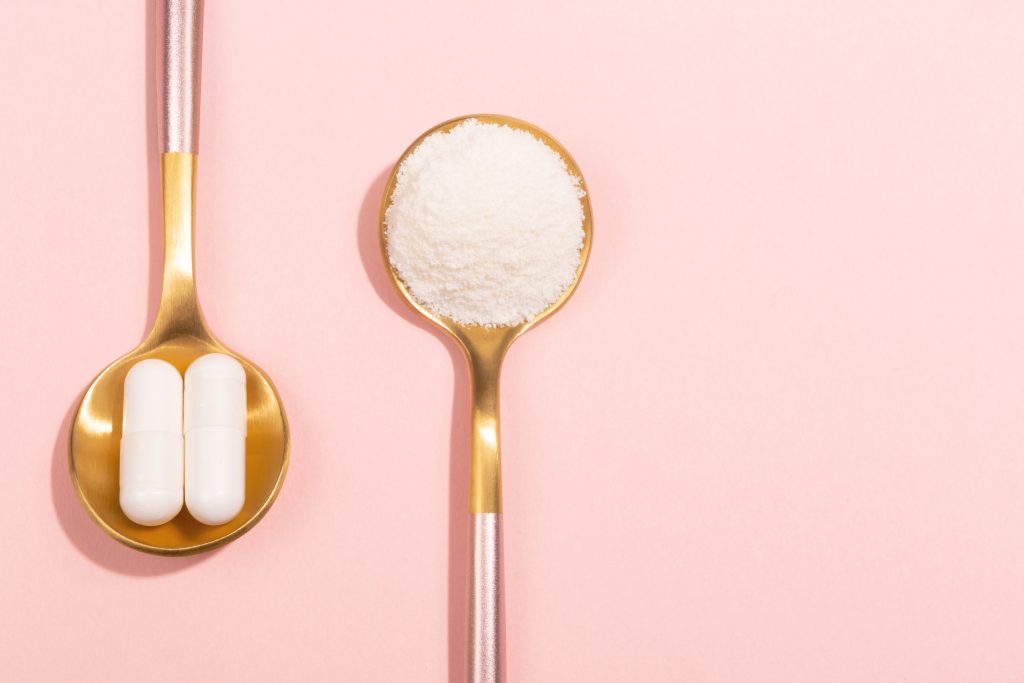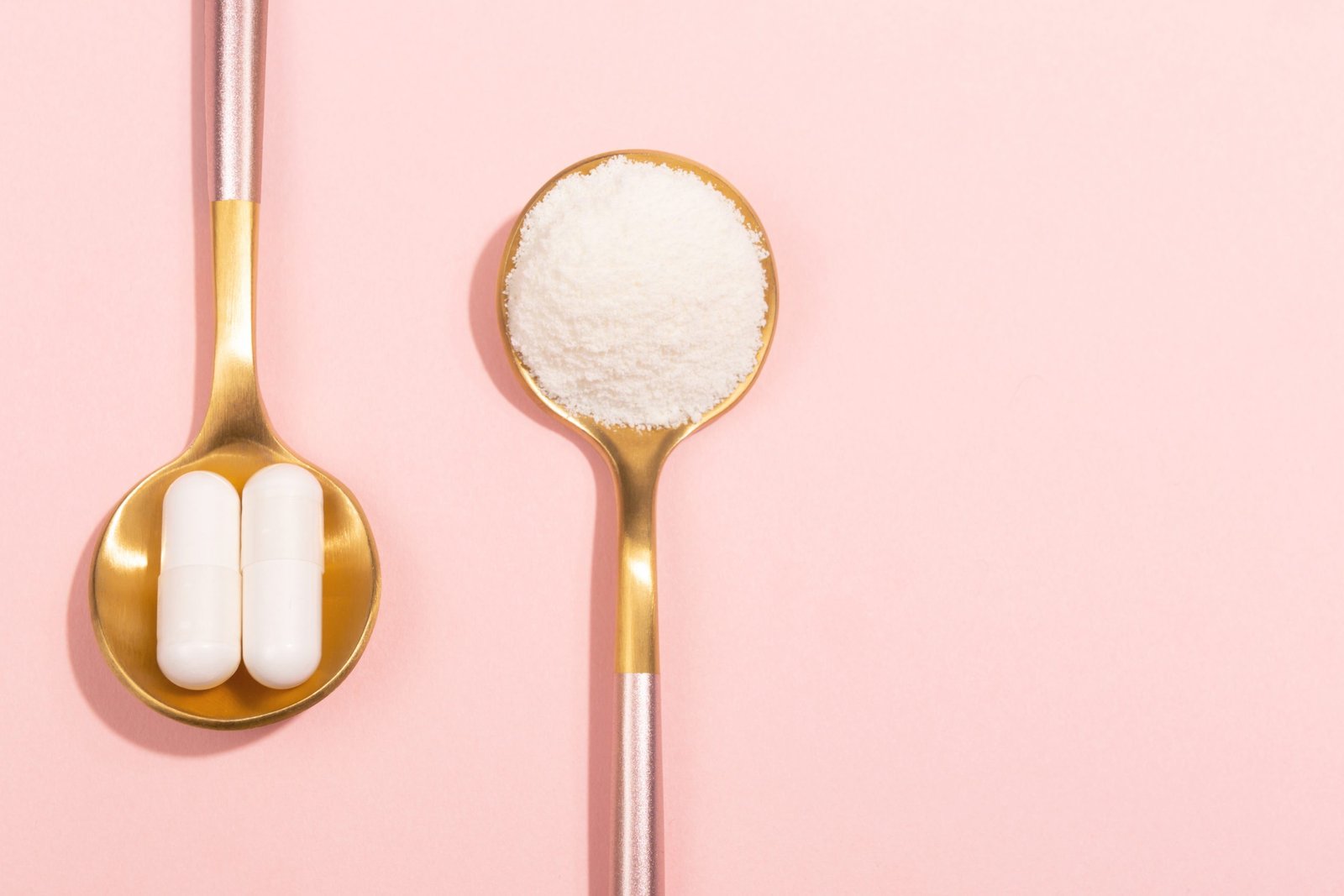
Collagen is the most abundant protein in the body. Its fiber-like structure is used to create connective tissue. As the name suggests, this type of tissue binds other tissues together and is the main component of bones, skin, muscles, tendons, and cartilage. Collagen helps make tissues strong, elastic, and able to withstand stretching.
In food, collagen is found naturally only in animal flesh, such as meat and fish, which contain connective tissue, but both animal and plant foods contain the materials our bodies need to make collagen.
As we age, our body’s collagen production slowly declines, but a sudden decline can occur due to excessive sun exposure, smoking, excessive alcohol consumption, lack of sleep, lack of exercise, etc. As we age, collagen in the deeper layers of our skin changes from a tightly organized network of fibers to a disorganized maze. [1] Environmental exposure can damage collagen fibers, reducing their thickness and strength and causing wrinkles on the skin’s surface.
Collagen supplementation
Though collagen is abundant in the body, it’s a top-selling supplement that purportedly improves hair, skin, and nails, the source of youth. The idea of taking a pill that has no side effects and can potentially reverse the signs of aging is appealing to many, and online searches for collagen have been steadily increasing since 2014, according to Google Trends.
Collagen first appeared as an ingredient in skin creams and serums. However, its effectiveness as a topical application was questioned even by dermatologists because collagen is naturally found in deeper layers of the skin, not just on the surface. Collagen fibers are too large to penetrate the outer layers of skin, and studies have not shown that shorter collagen chains, called peptides, are more effective at penetrating the skin.
Oral collagen supplements taken in the form of tablets, powders, or certain foods are believed to be more effectively absorbed by the body and have rapidly become more popular among consumers. Sometimes sold as collagen peptides or hydrolyzed collagen, these are collagen that has been broken down so that it is more easily absorbed. Collagen supplements contain amino acids, the building blocks of protein, and some contain additional nutrients associated with healthy skin and hair, such as vitamin C, biotin, and zinc.
What are the research results on collagen supplements?
Most of the research on collagen supplements has been related to joint and skin health. Although human studies are lacking, several randomized controlled trials have found that collagen supplements improve skin elasticity. [3,4] Other studies have found that supplements can improve joint mobility and reduce osteoarthritis and joint pain in athletes. [5] Collagen makes up around 60% of cartilage, the very tough tissue that surrounds bones and cushions high-impact movements, so when collagen breaks down, cartilage is lost and joint problems can occur.
However, potential conflicts of interest exist in the field, as most or all of the research on collagen supplements has been funded or funded in part by related industries that could benefit from positive findings, or one or more of the study authors have ties to those industries. This makes it difficult to determine whether collagen supplements are truly effective and whether they are worth their often-high price tag.
The downside to collagen supplements is that it’s unclear what’s in them and whether they will do what they say they do on the label. There are also concerns that collagen supplements may contain heavy metals. In the United States, the Food and Drug Administration does not review supplements for safety or effectiveness before they are sold to consumers.
Another potential drawback is that taking collagen supplements may be an excuse for not engaging in healthy behaviors that would prevent collagen loss, like getting enough sleep and quitting smoking.
That said, available studies have not found any adverse effects in people who take collagen supplements. [3,4]
Can you eat collagen?

Foods that contain collagen
- There are many foods rich in collagen, especially tough meats that are rich in connective tissue, such as pot roast, brisket, and chuck steak. However, consuming large amounts of red meat is not recommended as part of a long-term healthy, environmentally friendly diet. Collagen is also found in the bones and skin of freshwater and saltwater fish. [2]
- Bone broth, a trendy food commonly found in the soup aisle, is touted as a collagen-rich health food. The process involves simmering animal bones in water and a little vinegar (which helps dissolve the bones and release the collagen and minerals) for 4 to 24 hours. However, the amount of amino acids can vary from batch to batch depending on the type of bones used, the cooking time, and the amount of processing (such as whether it’s packaged or canned).
- Gelatin is a type of collagen made by boiling animal bones, cartilage, and skin for several hours and then cooling the liquid to solidify. Gelatin is produced when these connective tissues are broken down. Collagen and its derivative, gelatin, are recommended in certain diet plans, such as the paleo diet.
Foods that promote collagen production
- Several high-protein foods are thought to promote collagen production because they contain the collagen-building amino acids (glycine, proline, and hydroxyproline). [6] These include fish, poultry, meat, eggs, dairy products, legumes and soy.
- Collagen production also requires nutrients such as zinc, which is found in shellfish, beans, meat, nuts, seeds and whole grains, and vitamin C, which is found in citrus fruits, berries, leafy greens, peppers and tomatoes.

In fact, bone broth contains only traces of the minerals naturally found in bones, such as calcium, magnesium, potassium, iron, phosphorus, sodium, and copper. The amount of protein you get from gelatin ranges from 5 to 10 grams per cup.
There are concerns that bone broth may contain toxic metals, such as lead: One small study found that bone broth made from chicken bones contained three times as much lead as chicken broth made with just meat. [7] However, the amount of lead in one serving of bone broth was less than half the amount the Environmental Protection Agency allows in drinking water. Another study found that homemade and commercial bone broth contained low levels of calcium and magnesium (less than 5% of the recommended intake), as well as heavy metals such as lead and cadmium. [9] Research points out that a variety of factors can affect the amount of protein and minerals extracted from bone broth, including acidity, cooking time, cooking temperature, and the type of animal bone used, so the nutritional value of bone broth can vary widely.
Healthy lifestyle habits may help
In addition to a healthy, balanced diet, here are some habits you can follow to help protect your body’s natural collagen:
- Wear sunscreen or limit your exposure to direct sunlight (for most people, 10-20 minutes of direct midday sunlight 3-4 times a week is enough vitamin D).
- Get enough sleep. For the average person, this means 7-9 hours per night.
- Avoid smoking and secondhand smoke.
- Control your stress. Chronically high cortisol levels can decrease collagen production.
- While the exact relationship between exercise and skin quality is unclear, some studies have found that exercise slows the activity of cells involved in skin aging. [10]
Conclusion
At this time, there is a lack of industry-funded research on collagen supplements.Natural collagen production can be supported through a healthy, balanced diet with adequate protein foods, whole grains, fruits and vegetables, and reducing lifestyle risk factors.
Last updated May 2021
terms of service
The content on this website is for educational purposes only and does not provide personalized medical advice. If you have any questions regarding a medical condition, please consult your physician or other qualified health care provider. Never disregard professional medical advice or delay in seeking it because of something you have read on this website. Nutrition Source does not recommend or endorse any products.

